- Home
- Al Sarrantonio
Totentanz Page 12
Totentanz Read online
Page 12
"Jeff?" someone called, and for a moment his heart leaped at the thought that his brother had come out of the dark to save him once more. Sitting on the sled, he turned, half-smiling. It was not Tom, but Petey Graham, the half-wit. He loomed out of the twilight like a giant, his huge gawking frame forming a shadow in front of the flickering firelight behind him.
"Need help, Jeff?" he asked sincerely. He still held his carving tools and a formless piece of wood he was trying to turn into something that had a shape.
"No thanks, Petey."
"You sure? I heard them Major boys laughing, thought they might have dared you into something you didn't want to do."
Jeff choked back tears, suddenly hating his brother more than he ever thought he could.
"No, Petey, that's okay."
And then the sled seemed to move by itself, though it was his own hands that propelled it away from the lurking specter of Petey Graham and down the hill. He felt a momentary exhilaration as the first steep drop came. His stomach bottomed out as the sled picked up speed. The voices above faded, leaving him now with only darkness, and cold wind whip-ping his face. The sled moved swiftly and expertly along the well-worn path, and the target torches at the bottom already seemed bigger. For a supreme moment Jeff felt in control of all that was happening. He felt grown up.
But that moment passed. The toboggan was moving with purpose now. Jeff realized with a flash of panic that he didn't know how to steer it. Torn had always handled that part, had never really explained it to him, and here, about halfway down, when the second steep drop occurred, there came a point when the rider had to assume control of the sled. That point came, and Jeff didn't know what to do. He was moving too fast. Finally he threw out his feet to try to slow himself, but he only upset the movement of the sled and tore off one of his boots. Though the sled steadied, he knew that he was at the mercy of the toboggan and the snow and the night.
He had never moved so fast. He could not see the torches at the bottom—and then he did see them, somewhere off to the right where they shouldn't be. He shouted, and something solid and black came up very fast, a chain of mountains it seemed, until he realized it was the half-broken fence around the churchyard. There was a momentary slackening in his speed and a thump as something ran under the sled. There was no time to think of this because he was accelerating again.
He thought he heard sounds above him, calls and shouts, but he couldn't be sure. He heard no laughter. Large blocks of night were moving past him—gravestones. He threw out his booted foot wildly, trying to stop his progress, and his knee abruptly buckled under him, throwing his chin into the front of the toboggan. He nearly lost consciousness. Still he did not slow down. Then before him he saw the twin lights at the bottom of the path, and a wild hope sprang up in him that all was miraculously well, that he had somehow come through the cemetery and regained the path. But this was not so. Once again he saw the fence—long, tapered fangs of wood—rushing at him until something intervened: a huge mountain of formed stone, large and curved, with a looming cross on top of it. The toboggan hit it, and his last agonized, hate-filled word before he flew off the sled to slam into this object was "Tom!"
He awoke in mud. There was mud in his mouth; he seemed awash in wet blackness.
He turned over. The sky was slate-colored and low, so overcast that it looked as though it touched the earth. There was rain, too, a solid, unending fall of water that made him want to turn over again and bury his face in the mud.
His mind cleared a little. There was shouting all around him, and screaming. "Tom?" he called, and in answer someone to his left gave a groan. He turned his face in that direction and saw a human form, certainly not his brother Tom, trying to turn toward him. The prone figure seemed made of mud, with a heavy, mud-colored overcoat and something in one hand, a long stick it looked like, also mud-colored. It was a rifle. The man holding it groaned once more.
There came excited shouting near him, and Jeff managed to raise his eyes out of the mud to see a dim line of men running his way. He saw that they were wearing gray overcoats and had bayonets lowered. Behind him, he heard more cries, though they were farther away and less enthusiastic. The running men were nearly upon him when the groaning man to his left gave a loud shout and suddenly rose to his feet. He was delirious. His rifle was still in the mud. He held his hands out and shouted "Captain! Captain!" Jeff saw now that the man had a beard, cropped close to his face, despite that, he could not have been more than nineteen or twenty. Though he was a soldier of his own army, Jeff did not know him. He must have wandered in from another regiment.
Then the graycoats were upon them, and as the groaning soldier lurched forward, he gave a sudden scream and was driven back and down into the mud by a bayonet held by a Confederate with a half-wild look on his face. The rebel's mouth was open, and to Jeff he looked half-man, half-fish, gulping wildly at the air as if it held water that he needed for sustenance. The downed man's screams seemed to waken him, and he suddenly looked very frightened, trying desperately to remove his bayonet from the struggling figure; his fellows were streaming by him, yelling curses and encouragement. Finally, in a panic, the gray-clad soldier put his foot on the screaming man as if he were a clod of earth and pulled his rifle free. The man sank back into the mud, twitched, and then lay inert as the Confederate moved on.
Jeff kept still as death, with his face toward the bayoneted soldier, his teeth clenched to keep from crying out. He felt a heavy boot on his ankle and wanted to yell at the pain. The boot moved on, grinding into the skin below his heavy trouser, but he managed to keep quiet.
After a time, all the cries and other sounds receded. Jeff screwed up his courage and turned his head toward the battle. There was a fog of rain and smoke back there, with vague forms moving in and out of it. Besides that, there was nothing but mud and gray sky. He looked the other way and saw no reinforcements or laggers, so he rose up on his elbows and knees and crawled over to the bearded soldier.
“You hear me?" he whispered, moving down close to the man's ear. He turned the man's face toward him, away from the mud. The eyes were glassy and half-closed. Remembering what he had seen others do, he reached down to the man's neck and felt for a pulse, but there was none. As his hand moved away, it felt something slick and wet, not like mud, and he had to hold himself from vomiting when he saw that the Confederate soldier's bayonet, in being tom loose, had ripped the front of the man's chest almost to his shoulder blades. Most of what had been in his chest lay out on the ground or covered the front of his uniform.
Jeff must have fainted, for when he awoke, the sounds of battle were gone and it was night. Rain was still falling. He tried to stand but could not; his lower leg, where he had been trod on, was sore and swollen and ached terribly. He heard a sound close by and tried once more to rise but fell back down heavily and lost consciousness again.
He was awakened by the strike of something flat and heavy against his ribs. He grunted and rolled over, blinking at bright sunshine and the even brighter blue of the sky overhead. A shape was partially blocking that light, and he soon focused on it, pulling himself up into a sitting position. The figure was gray-clad, and his heart sank.
"Get on up, Yankee boy," the soldier said, prodding him hard with the butt end of his rifle. When Jeff made a tentative move, his swollen leg collapsed and he fell back down. The soldier butted him harder, in the same spot.
"I said get up, boy."
"I think my leg's broken," he told the soldier, trying to sound reasonable.
"Bull-drop it is. Get up." Again the flat of the rifle rammed into the same sore spot.
Not realizing what he was doing, Jeff rose with a shout and grappled with the rebel. The graycoat gave a bawl of surprise and fell back in the drying mud. They wrestled as if they were in a farmyard pen back home. To his surprise, Jeff easily mastered his adversary, taking his gun and throwing it off to one side. He had planted two solid jabs on the other's jaw and drawn his fist back again when he
was hit solidly on the head from behind and went down.
He awoke this time to find two soldiers standing over him: the one he had beaten to the ground and another who had apparently been doing sweep-up with him. He felt soreness not only in his leg and on the back of his head, but in his ribs and farther down his back, around his kidneys. They had obviously worked him over after he blacked out. When he put his arm to his head, another kick landed on his back, and he rolled over with a loud exclamation.
"Seems we got us something real special here," one soldier said to the other.
"Get up," the one who had originally found him said in a harsh tone.
Jeff pulled his legs under him and sat up, waiting for further blows and half covering his head.
"Sure hope you're a reb, boy," the second soldier said.
"He don't look like no reb," the other said. And then he laughed hoarsely. "Get th' hell to your feet."
Jeff got up, an ache at a time, and then he discovered that his uniform was gone. He was clad only in his long johns.
"Put your clothes back on," one of the two rebels said. Jeff got his first good look at him. He was no more than sixteen, without a trace of chin hair. He had mean, hard eyes. The other looked ten years older but had the same grit-filled look about him. The younger, smaller one indicated a pile of civilian clothes on the ground at Jeff's feet.
"Where's my uniform?" Jeff asked.
"Them's your clothes; put 'em on," the older one said.
"Give me my uniform," Jeff said, trying to demand but knowing how weak his voice really was.
The older Confederate shook his head and grunted. "Sure hope for his sake he ain't no spy," he laughed, and then the other one stepped forward, and soon Jeff was on the ground again.
When he rose to consciousness, it was nighttime and he was in the back of an open wagon. The moon was up and almost full. There was stationary torchlight off to his right, which meant the wagon was standing still. He sat up, putting his hands on his knees, and discovered that he had been dressed in the civilian clothes: an overlarge jacket and vest, and too-short pants, no shoes and unmatched socks. The pants itched him, but this was the least of his worries. When he tried to lower himself from the wagon, he saw that it was being guarded by two soldiers who, with glaring looks, made sure he stayed where he was.
"Bring him here, Sergeant," he heard a voice say in the darkness. In another moment he was half-carried, half-walked toward what looked to be, in the moon and torchlight, an officer.
The officer addressed him. "Can you stand on your own?" With a leap of hope, Jeff noted that the man's voice was not without kindness.
Jeff nodded; but when the sergeant and his escort released him, he promptly sank to the ground. A camp stool was brought for him, and he was made to sit on it. Someone gave him a tin cup filled with coffee.
The officer let him drink for a moment and then spoke. "I'm sure you're aware of the predicament I'm in—" he began, but Jeff cut him off.
"I am Jeffrey Scott, Third Union Army, Fourteenth Infantry. My uniform was forcibly stripped from me by two of your men. I was put in these clothes against my will." He looked as steadily as he could at the officer. "I am not a spy."
The officer tapped the fingers of one hand against the back of the other and regarded Jeff soberly.
"I probably shouldn't say this," he said. He paused, clasped his hands behind his back. "In fact, I know I shouldn't. If I chose, I could have you tried right now, even in the condition you're in; could have you shot in the morning. But I know those boys of mine who brought you in, and I know they're lying. Your clothes don't fit. You're a Union man, all right, but you're no spy. Why in hell would a spy, dressed in civilian clothes, be out in the middle of that battlefield?" He stopped, turned his back on Jeff. "I don't like the North. I don't like what it's done to this country or the way it's running this war. My job is not to like Union soldiers." His hands gripped one another tightly. But I don't like what's been done to you. It's just not . . . right. I've got people up North, family; always have had." He turned around, and Jeff saw how angry he was. "And dammit. I can't stand not to act like a gentleman!" He moved closer. "This is what I've done. I've sent an envoy to your people, asking for an exchange of prisoners. I want two of my soldiers for their one captured spy. If they respond, I'll send you back. Otherwise—"
"What about the two men who did this to me?"
The officer furrowed his brow. "I've got a whole company to worry about. I think you know what would happen if I dressed them down for bringing in a Union man."
Before Jeff could respond, the officer turned away. "That's the best I can do.”
It was cold that night. No one offered him a blanket, though they did let him edge close to the meager fire that burned near the wagon. An eerie silence had descended over what had been a day before, one of the bloodiest battlefields of the war.
Groups of men huddled outside their tents and in front of their fires and joked or swapped boasts about women or their battle prowess. Jeff could hear the same activity in the Union camp across the field. Occasionally, when the wind was right, the strains of a lonely harmonica reached his ears. Someone gave him another cup of coffee, but no one offered to engage him in conversation.
Just before dawn he managed to stretch out in the back of the wagon and fall asleep. But almost immediately he was awakened by a sergeant with long moustaches and tired eyes. The sergeant looked at him coolly for a few moments and then spat deliberately on the ground.
"Seems them bastards across the way want nothing to do with you." he said.
Jeff was stunned. "I can't believe that."
"Say they know nothing about no spy. They even deny they know anybody by the name of Jeff Scott." Behind the sergeant, Jeff saw the first tint of morning, giving the man a faint orange silhouette in the chill air. The sergeant spat again and wiped a bit of spittle from his untrimmed upper lip.
“Captain seems to think they just can't be bothered since you was found without your uniform on."
Jeff's pulse began to race. "Can they do that?"
The sergeant shrugged. "Union Army, friend."
"Oh, God."
"Yep," the sergeant said in a drawn-out way. "Seems we got to shoot us a spy this morning." He spat yet again and added, "Unless of course he was to get away."
Jeff lifted his head, seeing the slight, ironic smile on the man's face.
"I don't like them two boys brought you in," he said. "Me and the captain had a talk and we decided you ought to escape. Might mean I'll take a day in the stockade. But I think I can see to it that those two boys take the blame for me."
"You'll do that?"
The sergeant put up a restraining hand. "Hold on now, sonny. It ain't all peaches. You may even get shot on the way back over there. Then again, if you make it, you'll have to spend the rest of this war with them Union bastards." He spat again, wiped a sleeve across his mouth. He snorted. You see, there's a war, and then there's the right thing. Sometimes the two don't mix. But sometimes they do. We don't have no blue-boy uniform to put on you so you'll have to take your chances." He stepped closer, and Jeff could smell tobacco juice. "And I got to tell you that if this battle heats up later today and I meet you out on that slab of mud, there's nothing on God's bastard earth that'll make me hesitate before putting a ball of lead in your heart. You hear me?"
Jeff nodded. Almost before he knew it, the sergeant had him down off the wagon and out on the battlefield. He was given a thirty-yard lead, and then the sergeant sent up an alarm. Soon there were shouts and a few tentative rifle shots over his head. He ducked low and crawled on his belly toward the Union lines, which were farther away than he had thought. He moved quickly, with intermittent shots still ringing over him. Twice he hit an obstruction that proved to be a dead, rigor mortised body. Once he almost moved straight into a bayonet-tipped rifle lodged at an angle in the now-hard mud and just missed losing an eye to it. After a while, the shots behind him faded and he was able to r
ise.
He found himself eye-to-eye with a blue-clad figure, someone he vaguely knew from his own regiment. Before he could open his mouth, the man had raised his rifle. There was a sudden burning pain in his thigh where the bullet found its mark. Then he was on the ground, looking at the growing blue-red light of day dawning as the soldier whooped, "I shot a reb! I shot him!"
I'm going to die, Jeff thought.
A hatred as he had never known, a hatred mixed with the solid fear of death, especially of this unjust death, filled every pore of his body. He screamed, clutching at the dawning day with his fingers, trying to hold it. He could taste the hate and the fear. The blue sky began to pull away, and there was blackness behind it—stark, rock-solid blackness that was curling down around him—and there was someone very close, just behind or in front of him, sucking voraciously at the fear and hatred, and turning to ask him
But in an instant it was all gone, the blue sky back and the hate and fear diminished. The boy who had shot him was crying, "My God, it's Jeffrey Scott," and someone else, interrupting in a calm, hard voice, said, "He'll be all right, he'll live. . . ."
Yes, he exulted, his mind bursting with joy, and the fear and the hate bled out of him. I'll live!
But then he was on the scaffold in Montvale, and Mayor Poundridge was staring up at him calmly, and the ground gave way, and that horrible bursting pressure came into his chest and head and eyes, and then everything exploded, and the hatred returned, along with the fear, only this time it didn't go away. It got worse instead. I'm dying! he thought, and the hatred filled him as it had on that battlefield, but now it spilled over and exploded along with his head and eyes and lungs. Even as the last molecule of air was wrenched from his chest by his screaming blood, as his red corpuscles cried desperately for more air and found none, his body, his blood, all of him, screamed hate. His eyes, burning like coals in their aching sockets, looked out at them—those he had grown up with, played with, fought with—and wanted to see them dead. All of them. They were responsible; and even more than the continuation of his own life, he wanted their lives ended. The mayor, the sheriff, the Major boys, Melissa Poundridge (who had promised herself to his brother Tom and then, when Tom went off to fight, hooked into and married Tom's best friend, Bill Gantry, whose rich father had bought his son's way out of the war), all of them.

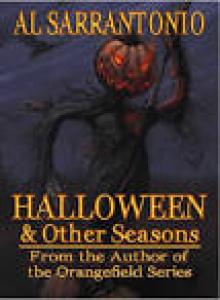 Five World Saga 01 Hornets and Others
Five World Saga 01 Hornets and Others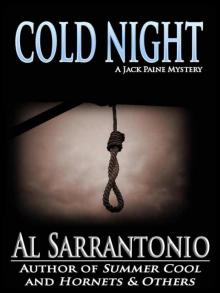 Cold Night (Jack Paine Mysteries)
Cold Night (Jack Paine Mysteries)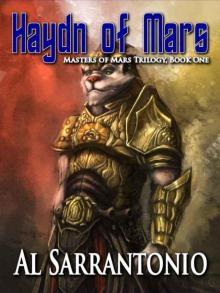 Haydn of Mars
Haydn of Mars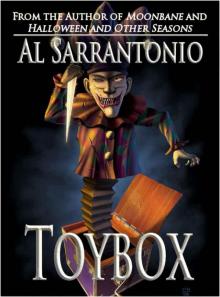 Toybox
Toybox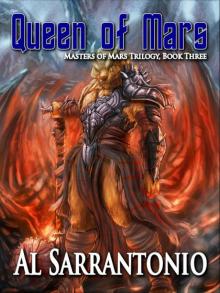 Queen of Mars - Book III in the Masters of Mars Trilogy
Queen of Mars - Book III in the Masters of Mars Trilogy Exile
Exile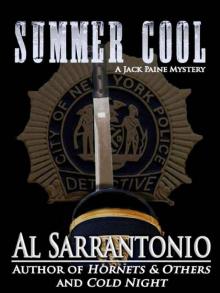 Summer Cool - A Jack Paine Mystery (Jack Paine Mysteries)
Summer Cool - A Jack Paine Mystery (Jack Paine Mysteries)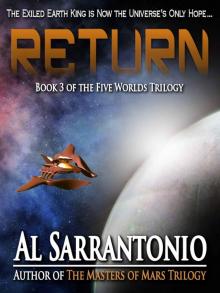 Return - Book III of the Five Worlds Trilogy
Return - Book III of the Five Worlds Trilogy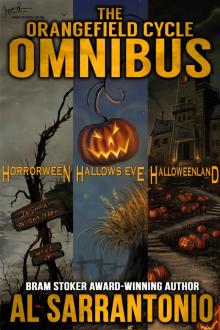 The Orangefield Cycle Omnibus
The Orangefield Cycle Omnibus Summer Cool jp-2
Summer Cool jp-2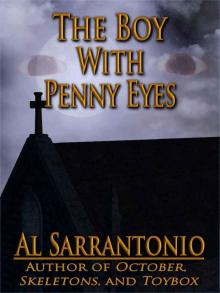 The Boy With Penny Eyes
The Boy With Penny Eyes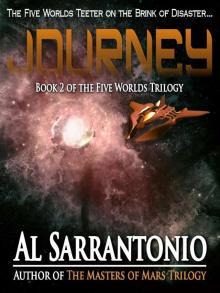 Journey - Book II of the Five Worlds Trilogy
Journey - Book II of the Five Worlds Trilogy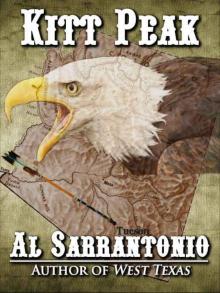 Kitt Peak
Kitt Peak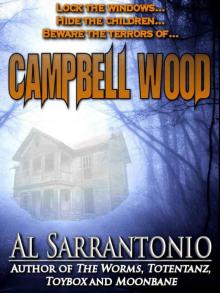 Campbell Wood
Campbell Wood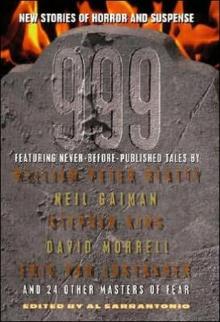 999
999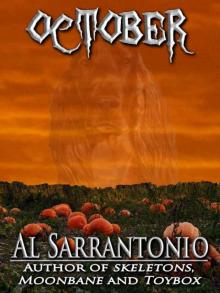 October
October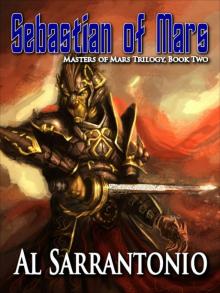 Sebastian of Mars
Sebastian of Mars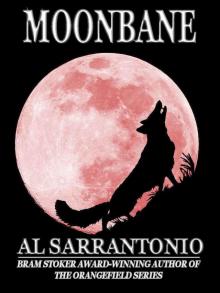 Moonbane
Moonbane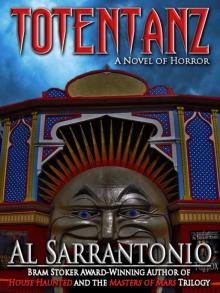 Totentanz
Totentanz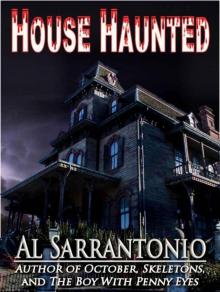 House Haunted
House Haunted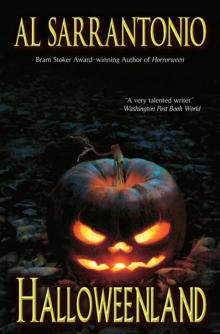 Halloweenland
Halloweenland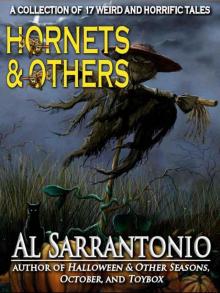 Hornets and Others
Hornets and Others